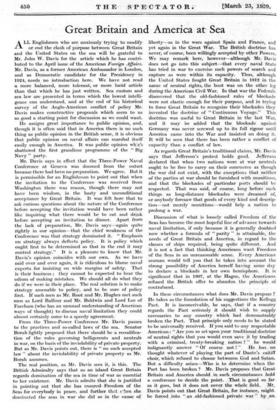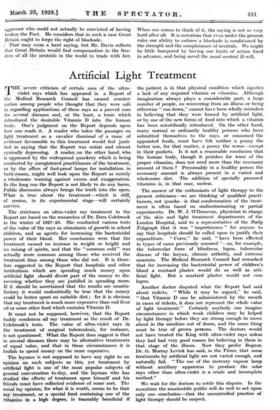Great Britain and America at Sea
ALL Englishmen who are anxiously trying to modify or end the clash of purpose between Great Britain and the United States on the sea will be grateful to Mr. John W. Davis for the article which he has contri- buted to the April issue of the American Foreign Affairs. Mr. Davis, as a former American Ambassador in London, and as Democratic candidate for the Presidency in 1924, needs no introduction here. We have not read a more balanced, more tolerant, or more lucid article than that which he has just written. Sea custom and sea law are presented in terms which the lowest intelli- gence can understand, and at the end of his historical survey of the Anglo-American conflict of policy Mr. Davis makes constructive proposals which seem to us as good a starting point for discussion as we could want.
He assigns great importance to public opinion, and, though it is often said that in America there is no such thing as public opinion in the British sense, it is obvious that public opinion on naval affairs can marshal itself easily enough in America. It was public opinion which shattered the first grandiose programme of the " Big Navy " party.
Mr. Davis says in effect that the Three-Power Naval Conference at Geneva was doomed from the outset because there had been no preparation. We agree. But it is permissible for an Englishman to point out that when the invitation to the Conference was received from Washington there was reason, though there may not have been wisdom, in the hasty and unconditional acceptance by Great Britain. It was felt here that to ask curious questions about the nature of the Conference before accepting the invitation would have been rather like inquiring what there would be to eat and drink before accepting an invitation to dinner. Apart from the lack of preparation, Mr. Davis says—again quite rightly in our opinion—that the chief weakness of the Conference' was that strategy dominated it. " Emphasis on strategy always deflects policy. It is policy which ought first to be determined so that in the end it may control strategy." It is a pleasure to know that Mr. Davis's opinion coincides with our own. As we have said over and over again, it is ridiculous to blame naval experts for insisting on wide margins of safety. That is their business ; they cannot be expected to bear the odium of making mistakes. We should all do what they do if we were in their place. The real solution is to make strategy amenable to policy, and to be sure of policy first If such men as Mr. Root and Mr. Hughes met such men as Lord Balfour and Mr. Baldsiin and Lord Lee of Fareham (who has an unusual understanding of American ways of thought) to discuss naval limitation they could almost certainly come to a speedy agreement.
From the Three-Power Conference Mr. Davis passes to the practices and so-called laws of the sea. Senator Borah lightly proposed that there should be- a recodifica- tion of the • rules governing belligerents and neutrals in war, on the basis of the inviolability of private property. But as Mr. Davis points out, there is " no such accepted law " about the inviolability of private property as Mr. Borah assumes.
The real position, as Mr. Davis sees it, is this. The British Admiralty says that as an island Great Britain regards domination of the sea in time of war as essential to her existence. Mr. Davis admits that she is justified in pointing out that she has ensured, Freedom of the Seas for everybody in peace, and further that c-hen she dominated the seas in war she did so in the cause of liberty—as in the wars against Spain and France, and yet again in the Great War. The British doctrine has never, of course, been willingly accepted by other Powers. We may remark here, however—although Mr. Davis does not go into this subject—that every naval State has tried in war to exercise such powers of search and capture as were within its capacity. Thus, although the United States fought Great Britain in 1812 in the name of neutral rights, the boot was on the other leg during the American Civil War. In that war the Federals discovered that the old-fashioned rules of blockade were not elastic enough for their purpose, and in trying to force Great Britain to recognize their blockades they invented the doctrine of " Continuous Voyage." This doctrine was useful to Great Britain in the last War, and it may be added that the blockade against Germany was never screwed up to its full rigour until America came into the War and insisted on doing it. It will be seen that there has been rather a conflict of capacity than a conflict of law.
As regards Great Britain's traditional claims, Mr. Davis says that Jefferson's protest holds good. Jefferson declared that when two nations were at war neutrals ought to be free to carry on their commerce as though the war did not exist, with the exceptions that neither of the parties at war should be furnished with munitions, and that the blockades of particular ports should be respected. That was said, of course, long before such things as long-distance blockades were dreamed 'of, or anybody foresaw that goods of every kind and descrip- tion—not merely munitions—would help a nation to prolong a war.
Discussion of what is loosely called Freedom of the Seas has become the most hopeful line of advance towards naval limitation, if only because it is generally doubted now whether a formula of " parity" is attainable, the needs of Great Britain and America, in regard to the classes of ships required, being quite different. And it is not a fact that thinking Americans want Freedom of the Seas in an unreasonable sense. Every American seaman would tell you that he takes into account the strong possibility of America herself having some day to declare a blockade in her own hemisphere. It is significant that in 1907, at the Hague, the Americans refused the British offer to abandon the principle of contraband.
In these circumstances what does Mr. Davis propose ? He takes as the foundation of his suggestions the Kellogg Pact. It is inconceivable, he says, . that if a country regards the Pact seriously it should wish to supply necessaries to any country which had demonstrably broken the Pact. That principle only needs to be stated to be universally received. If you said to any respectable American : " Are you so set upon your traditional doctrine of neutral rights that you would even save it by trading with a criminal, - treatrbreaking nation ?." , he would indignantly answer " Of course not " -He has no thought whatever of playing the part of Dante's caitiff choir, which refused to choose betweeen God and Satan. But a difficulty arises—Who is to determine when the Pact has been broken ? Mr. Davis proposes that. Great Britain and . America should in such circumstances hold a conference to decide the point. That is good so far as it goes, but it does not cover the whole field. Mr. Davis points out that Great Britain, for instance, might be forced , into , an old-fashioned private war " by an.- aggressor who could not actually be convicted of having broken the Pact. He considers that in such a case Great Britain ought to forgo the right of blockade.
That may seem a hard saying, but Mr. Davis reflects that Great Britain would find compensation in the free- dom of all the neutrals in the world to trade with her. When one comes to think of it, the saying is not so very hard after all. It is notorious that even under the present rules our ability to enforce a blockade is conditioned by the strength and the complaisance of neutrals. We might be little hampered by having our limits of action fixed in advance, and being saved the usual neutral

















































 Previous page
Previous page